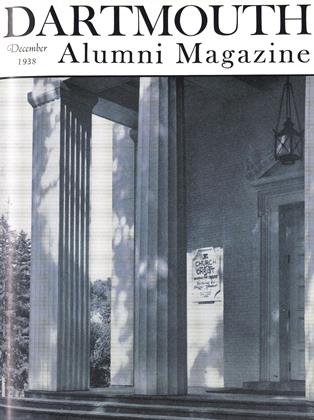by Henry A.Imus, John W. M. Rothney and RobertM. Bear, Dartmouth College Publications, Hanover, New Hampshire, 1938.
This study is an excellent example of cooperative research. The project was conducted by the Dartmouth Eye Institute, assisted by several departments in Dartmouth College and by Dr. John W. M. Rothney of Harvard University.
The main part of the study presents an elaborate survey of the ocular condition of 636 entering students in Dartmouth College. Since the survey was oriented to the problem of visual factors in the reading of college students, the ocular conditions investigated were more extensive than those of the ordinary ophthalmological examination. Eye dominance, handedness" and eyemovements in reading were measured. The results of the ocular examination were classified and correlated with the scholastic aptitude test which is given each year to college freshmen, the reading tests given each year by the English Department, the library information test and a standard test for reading ability, known as the lowa Silent Reading Test.
The results of this extensive survey failed to show any significant relationship between ocular condition and reading ability, success in college studies or scores on scholastic aptitude tests. "Ocular defects are not found more frequently among (1) students have reading disability or (2) students making low academic grades than among the rest of the group." "Correction of ocular defects does not guarantee increased ability in reading or greater academic achievement within one college year." These results are statistical findings which mask individual cases of positive value of ocular treatment for scholastic success. Since many reports have been made showing the influence of ocular difficulty and reading disability, especially in children, the completeness of the Dartmouth survey should establish it as definitive for the college level. In other words, the problems of reading disability in school grades and college are not identical. The Dartmouth survey has also made a contribution to all workers in this field by presenting an experimental check on the reliability and validity of the various standard techniques used in studying the process of reading.
An intrinsic part of the monograph is a report of the Dartmouth Remedial Reading Program by Professor Robert M. Bear. This report states in detail the purpose, the methods and the accomplishments of the remedial reading program. It might be interesting to know that about 200 students attend reading classes every year. Since attendance is voluntary, this, in itself, is an indication of the success of the program. The report gives some objective evidence of the value of remedial reading classes to students of low achievement in college, in terms of increased speed in reading and increased capacity for comprehending the material read. These gains apparently were maintained upon being retested after an interval of a year.
 View Full Issue
View Full Issue
More From This Issue
-
 Sports
SportsFootball Review
December 1938 By BILL CUNNINGHAM '19 -
 Class Notes
Class Notes1929*
December 1938 By F. WILLIAM ANDRES -
 Class Notes
Class Notes1918*
December 1938 By ERNEST H. EARLEY -
 Article
ArticleProposed Mew Webster Hall
December 1938 -
 Article
ArticlePublications Decision by Trustees
December 1938 -
 Class Notes
Class Notes1912*
December 1938 By CONRAD E. SNOW
Books
-
 Books
BooksA SENTIMENTAL JOURNEY.
JUNE 1970 By GEORGE M. YOUNG JR. -
 Books
BooksTHE AMERICAN PRINCESS.
OCTOBER 1971 By KATHERINE LEVER -
 Books
BooksTHE IMPACT OF FEDERAL TAXES
May 1943 By Lloyd P. Rice -
 Books
BooksPUBLIC EDU CATION AND ECONOMIC TRENDS,
October 1939 By Ray V. Leffler -
 Books
BooksTIME OF YEAR
April 1944 By Stearns Morse -
 Books
BooksAMERICAN HIGHWAY PRACTICE,
April 1942 By William P. Kimball '28

